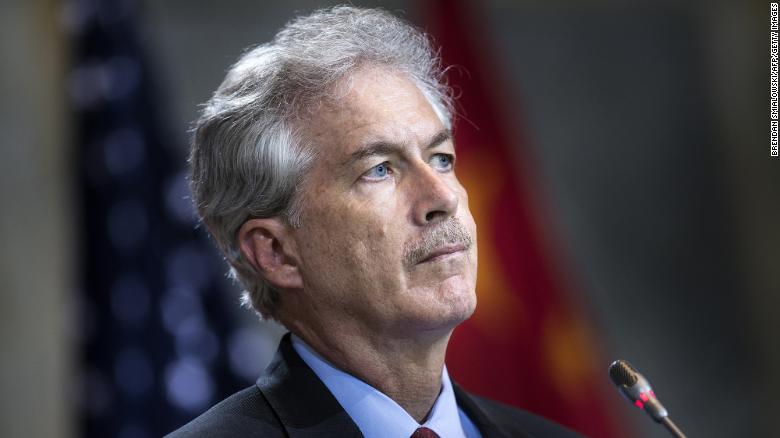President-elect Joe Biden on Monday will nominate William Burns as director of the Central Intelligence Agency, CNN has learned, tapping a respected veteran American diplomat who has served in posts around the world from the Reagan to the Obama administrations.
“The American people will sleep soundly with him as our next CIA Director,” Biden said in a statement.
If confirmed, Burns would become the first leader in the CIA’s history whose lifelong experience comes from the State Department.
“Bill Burns is an exemplary diplomat with decades of experience on the world stage keeping our people and our country safe and secure,” Biden said. “He shares my profound belief that intelligence must be apolitical and that the dedicated intelligence professionals serving our nation deserve our gratitude and respect.”
Biden was drawn to Burns because of his diplomatic experience and his perceived ability to restore credibility to the intelligence agency in the post-Trump era, people familiar with the matter said, along with his expertise on Russia. His selection would bypass other contenders with more formal experience in the intelligence field.
Burns, who is known as Bill, is president of the Carnegie Endowment for International Peace, a respected international affairs think tank in Washington. He served as deputy secretary of State in the Obama administration after working for more than three decades in positions across the foreign service, which he joined in 1982.
He also served under five American presidents, both Democrats and Republicans, and 10 secretaries of state in a variety of posts, including as ambassador to Jordan in the Clinton administration and to Russia under George W. Bush.
Burns has talked extensively about the damage he believes the Trump administration has inflicted on the United States’ foreign policy. He warned of the dangerous consequences of President Donald Trump not accepting election defeat in a prescient essay last August in the Atlantic.
“If he loses, I doubt that he will suddenly embrace the traditional bipartisan commitment to effective transitions. At best, he’ll be consumed by efforts to rationalize his defeat and paint the election as rigged; at worst, he’ll seek to contest or undermine the result,” Burns wrote. “Like so many other features of the Trump era, the transition would bear little resemblance to any before, or any of the many I served through as a career diplomat. The costs of confusion, mixed signals, and bureaucratic turmoil could be very high.”
Burns also has a long history at the center of Middle East peace negotiations and worked closely in the Obama administration on the Iran nuclear deal. He has limited experience with China, but otherwise has a extensive portfolio of work in key regions around the globe.
While all Biden nominees face an easier path to confirmation in a Democratic-controlled Senate, Burns’ role in the Benghazi investigation could also be revisited. He testified at a House hearing in 2012 after then-Secretary of State Hillary Clinton was unable to because of a concussion.
“We learned some very hard and painful lessons in Benghazi,” Burns said. “We are already acting on them. We have to do better. We owe it to our colleagues who lost their lives in Benghazi.”
The decision to select Burns to lead the CIA comes after other top contenders faced criticism for their previous support of torture programs. Former acting CIA director Michael Morell, who had been under consideration by Biden, was assailed as unacceptable by top Democrats on the Senate Intelligence Committee.
Sen. Ron Wyden of Oregon, a member of the Intelligence Committee, had criticized Morell as a “torture apologist” for his previous suggestions that “enhanced interrogation” of terrorists was effective and moral.
Burns, who is respected by Democrats and Republicans alike in the foreign policy arena, is expected to receive far easier confirmation. The CIA director position is not expected to be a formal member of Biden’s Cabinet, which represents a change from the Trump administration, but a return to the status it had in the Obama administration.
Avril Haines, whom Biden nominated as director of national intelligence, will represent the intelligence community on the Cabinet. Haines and Burns have a long-standing relationship and during an appearance last year at Columbia University, she praised Burns for being well known for providing thoughtful feedback during his time in government.
“Everyone always wanted to send their memos to Bill,” Haines told the audience.
While Burns was initially mentioned as a secretary of state nominee for Biden, one longtime CIA analyst made the case for his selection to lead the CIA in a blog post late last year.
“The appointment of Burns would send an important signal about the revival of public service, which has been demeaned for the past four years, and for the importance of the entire intelligence community, not simply the CIA,” Melvin Goodman, who served as a CIA analyst for three decades, wrote in a blog post for Counterpunch, arguing for the selection of Burns.
“Much of CIA’s difficulty over the past 40 years can be attributed to mediocre leadership. The CIA would be the major beneficiary of such an exemplary appointment to an institution that has become too insular and parochial.”
>>>>

